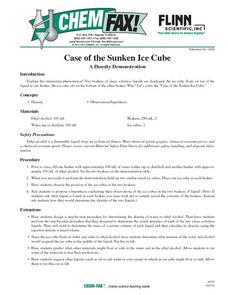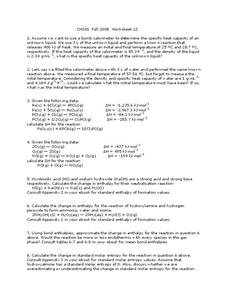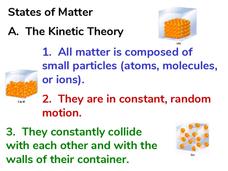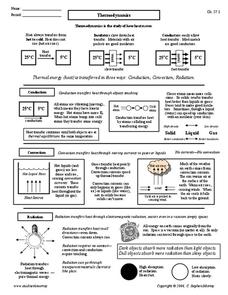Curated OER
Physical and Chemical Properties of Matter
Students identify the physical and chemical properties of matter. They review the types of matter. Students list the four states of matter (Solid, Liquid, Gas and Plasma). They recognize and describe the different types of matter.
Curated OER
Enthalpy and Thermochemistry Problem Set
In this thermochemistry activity, students answer questions based on the reaction of charcoal and liquid oxygen. Students write a balanced chemical equation, determine the limiting reagent, calculate the mass of each product, and amount...
Curated OER
Sink or Float?
Students will determine whether various objects sink or float in water. They do not need to explain why objects sink or float. They are rather to be encouraged to observe that the same objects will sink or float every time, i.e., that...
Curated OER
Convection and Wind
Students use water, beakers, hot plates, paper dots, and goggles to participate in a hands on activity where they see how a convection current creates wind. In this convection current lesson plan, students participate in a hands on...
Curated OER
Models of Planets
In this planet models worksheet, students use the radius of a given planet and its mass to answer questions using a model of a planet with a given radius. They determine the volume of the planet's inner core, the volume of its outer...
Curated OER
Volumw Measurement, English System
Eighth graders biew each volume container and discuss where they have seen them in their home, and how they have seen them used. They explore the different names of volume sizes and their equivalents towards one another. Students...
Curated OER
Mission Planning: Earth/Mars Comparisons
Learners compare and contrast conditions on Mars to those on our own planet, specifically, their local or regional environments. The physical characteristics, the atmosphere, and other astronomical data is considered.
Curated OER
Chemistry: The Case of the Sunken Ice Cube
Students examine a density demonstration involving ice cubes and beakers of water and alcohol. After observing how one ice cube floats in water and sinks in alcohol, they determine which mixture of the two would suspend the ice cube in...
Curated OER
Calorimetry
In this calorimetry worksheet, students determine the specific heat of an unknown liquid. Students calculate the change in enthalpy for given reactions. This worksheet has 20 problems to solve.
Curated OER
Cody's Science Education Zone
Students observe a scientific experiment and pose a hypothesis. In this scientific inquiry lesson, students make predictions about the combination of alcohol in water and how it will affect a floating ice cube.
Curated OER
Effects of the Southern Pacific Railroad Causeway
Fifth graders describe the appearance of a substance before and after a physical change. They re-create the Southern Pacific Railroad Causeway across the Great Salt Lake. They determine for themselves how the water is exchanged...
Curated OER
Sea Ice
Young scholars observe the freezing times and temperatures of water with varying levels of salinity. They determine how icebergs form, how they act, and what they may be made of. They discover that salinity level affects the time it...
Curated OER
Get to know H2O!
Students investigate scientific concepts and inquire about physical states of matter. The transition of water is considered and is easy to facilitate because of its abundance and often observed physical changes.
Curated OER
What's In Crude Oil?
Students investigate crude oil. In this crude oil lesson, students investigate fractional distillation and use this technique to separate two liquids.
Curated OER
Buoyant Force
Students investigate the scientific concept of why some objects float when put in a liquid solution. They apply the laws of motion and force while conducting classroom activities. Students also take notes and answer target questions to...
Curated OER
The Solar System: Why do we Explore?
Third graders act as scientists. In this property discovery lesson, 3rd graders explore the substance "Oobleck" (cornstarch, water, food coloring). They work in groups to investigate the substance and make observations as a scientist...
Curated OER
Sink or Swim
Students define density and explain how to determine the density of an object. Students participate in a demonstration that shows the differences in the densities of different liquids and how they affect the liquid's physical properties.
Curated OER
Testing for Conductivity
Students test the conductivity of selected liquids and solids. They test the circuit by touching the two free ends of the wires together and add salt little by little recording the data after each addition. Finally, students predict...
Curated OER
States of Matter
This particle PowerPoint includes many pictures to illustrate solids, liquids and gasses and the behavior of their particles.
Curated OER
Thermodynamics
In this thermodynamics instructional activity, students learn about insulators and conductors. Students compare the three ways thermal energy is transferred: conduction, convection, and radiation. This instructional activity has 22...
Curated OER
Thermodynamics
In this thermodynamics worksheet, students read about conduction, convection and radiation. They answer 47 questions about heat transfer, thermal equilibrium, insulators, conductors and the states of matter.
Curated OER
Chemistry Midterm Practice Exam
A comprehensive practice exam, this resource covers many areas of chemistry. The test includes 71 multiple choice questions on topics such as problem solving, chemical equations, chemical formulas, thermodynamics, acids and bases, and...
Curated OER
Chapter 13 Review, Section 2: Ions in Aqueous Solutions and Colligative Properties
Here is a general chemistry worksheet that incorporates practical applications. Four questions employ critical thinking about solutions, boiling and freezing points, and molar mass. Your class will practice what they learn in class by...
Curated OER
Dry Ice: Simply Sublime
A fascinating lesson on states of matter is here for your young scientists. Dry ice is used to challenge learners preconceived notions about how solids work. They discover all sorts of interesting facts about states of matter from...

























